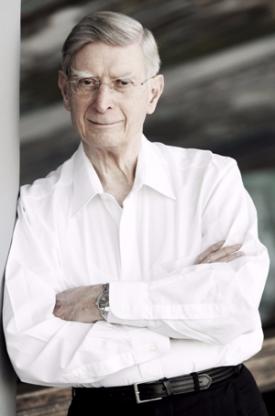Blomstedt, Philharmonic achieve mixed results with Beethoven

Herbert Blomstedt conducted the New York Philharmonic in a Beethoven program Wednesday night. Photo: Martin Lengemann
It is said of long-lived conductors like Pierre Monteux and Leopold Stokowski that, even when enfeebled by age, they could ignite an orchestral cataclysm with the arch of an eyebrow or the flick of a finger.
But one wonders. Wednesday night in David Geffen Hall, conductor Herbert Blomstedt, who will turn 90 next July, looked trim and agile as he strode onstage to lead the New York Philharmonic in Beethoven’s Seventh and Eighth symphonies. Yet he conducted without a baton and with constricted gestures, apparently to conserve energy. The resulting performances were well below this orchestra’s usual standards of ensemble and expression.
It’s possible that preparations for Thursday’s gala concert celebrating music director Alan Gilbert’s 50th birthday have distracted the orchestra from Blomstedt’s program. Whatever the reason, this noted Beethoven exponent and former leader of the Staatskapelle Dresden, the Gewandhaus of Leipzig, and the major orchestras of San Francisco and Oslo, among others, could produce only ragged and intermittently effective playing from the Philharmonic on Wednesday.
One can hope that, with the birthday gala behind it, the orchestra will focus on this program more and raise the standard for subsequent performances.
Beethoven’s Eighth Symphony, which opened the program, starts with a big horselaugh that’s not easy to do from a standing start, and it’s understandable if an orchestra hasn’t quite found its footing in those first few measures. On Wednesday, however, problems of ensemble persisted throughout the movement, causing fuzzy tone in the strings and tentative attacks in the winds.
Beethoven’s heavier effects, particularly his fondness for upsetting the rhythmic applecart with persistent sforzandos on weak beats, received due attention and livened up the proceedings. Blomstedt’s steady tempo and well-managed crescendos kept the movement’s structure in view, but many nuances and details went unrealized.
The symphony’s middle movements are full of sass and surprises, but Wednesday’s in-the-ballpark interpretation missed most of the jokes in the Allegretto scherzando and the minuet’s sudden pokes in the ribs. Imprecise ensemble and under-preparation appeared again to be the culprits.
The finale offered little improvement in those areas, but Blomstedt’s well-timed pauses and turns generated excitement, so that the performance could at least close on a vigorous note.
The performance of the Seventh Symphony represented a sizable step up from that of the Eighth. Driven by the first movement’s persistent skipping rhythm, the orchestra not only played better and more cohesively but realized Beethoven’s piquant dialogues among the sections and made meaningful connections between the disparate materials. The orchestral sound was focused in pianissimo and rich in forte.
While still a little short on freshness and surprise, this performance of the Seventh, thanks to improved playing and Blomstedt’s sense of structure, made musical sense in a way the Eighth had not.
The conductor began the second movement almost without pause after the first, calling attention to the pregnant shift in mode from A major to A minor. He maintained the tension in the haunting theme as it returned over and over in new guises, and created an effective performance while hewing close to Beethoven’s instructions in the score.
The third movement was Presto and then some, flying along to a toe-tapping rhythm punctuated by sudden forte shouts. Tight ensemble and revealing details in the repeats of the theme made this the most satisfying movement of the evening.
By comparison, the frenetic finale seemed somewhat predictable and lacking in dramatic buildup, although horns and brass did their best to top themselves in each successive fortissimo. Nevertheless, this more-than-competent performance had the audience on its feet at the end–because, really, who can resist the ending of Beethoven’s Seventh, whether played superbly, just okay, or in between?
The program will be repeated 11 a.m. Friday and 8 p.m. Saturday. nyphil.org; 212-875-5656.


